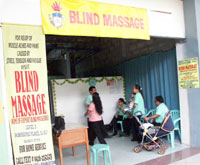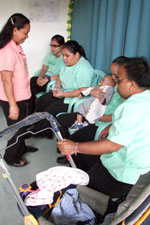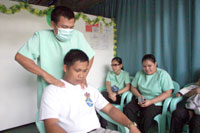The world as 'seen' by the blind at the Blind Massage Center

Paving my way in towards a small dimly lit cubicle, I stopped to stare at a small, seemingly uninviting bed, waiting for me to linger for sixty minutes of repose and pleasure. As I anxiously looked forward for those hands to work its wonder on my body, I comfortably lied on my stomach and let my nerves loosen up. Josela Baylon, the masseuse I particularly picked, came into the room and adamantly asked me a few questions before proceeding with the massage. Probably sensing that I am a first-timer, she assured me that it's going to be an easy and unpainful session.
For 300 pesos you can get a whole body massage. The fee is perhaps too expensive for someone who's not an enthusiast in getting a tension releasing body work-up and for those people who are used to getting a budget friendly "hilot" from a barber or an untrained masseuse. The payment may be considered to be at par with the massage services being performed by spa centers where medium to high class strata of society prefer to go but this massage center strategically located at the upper level of the Robinsons Mall is special if not extraordinary.
 Their services is aptly called a "blind massage" obviously due to the blind masseuses and masseurs who perform the treatment for the relief of muscle pains and aches usually caused by stress, tension and fatigue. They are trained by professionals either through an organization or a foundation that establishes outreach programs all over the country for people with disabilities particularly for the deaf and blind. For Josela, who acquired an inborn congenital blindness, she was trained by Father Ludy Rustin, a prominent facilitator of the Christian Foundation for the Deaf and Blind At the age of 21 she was given a chance to be employed as a masseuse and was later hired by the Center for Advocacy Learning and Livelihood Foundation of the Blind or CALL Foundation, a non-government program based in Manila, with the help of the School for the Blind being lead by its President, Jose Fernandez, who is a blind teacher. Josela reveals that she is originally from Negros but was sent here by the Foundation as they see the need for blind massage centers here in Iloilo City.
Their services is aptly called a "blind massage" obviously due to the blind masseuses and masseurs who perform the treatment for the relief of muscle pains and aches usually caused by stress, tension and fatigue. They are trained by professionals either through an organization or a foundation that establishes outreach programs all over the country for people with disabilities particularly for the deaf and blind. For Josela, who acquired an inborn congenital blindness, she was trained by Father Ludy Rustin, a prominent facilitator of the Christian Foundation for the Deaf and Blind At the age of 21 she was given a chance to be employed as a masseuse and was later hired by the Center for Advocacy Learning and Livelihood Foundation of the Blind or CALL Foundation, a non-government program based in Manila, with the help of the School for the Blind being lead by its President, Jose Fernandez, who is a blind teacher. Josela reveals that she is originally from Negros but was sent here by the Foundation as they see the need for blind massage centers here in Iloilo City.
Among the seven masseuses, Josela seems to be the more in demand, as she was told that another client is waiting outside. As I am on the smooth process of tranquility through what she says a finger pressure massage therapy for physical and energy rebalance called shiatsu, she gave me permission to ask her a few personal questions, however unsure of my identity and credibility as a person. She began telling her story at the time when her parents was trying to save her when she was five months old up to the day when the doctors confirmed she will never see for the rest of her life, and have given up hopes of restoring her sight. "No matter how painful it is, my parents couldn't do anything more due to insufficient financial resources," she explains. Growing up, she would have difficulty going around even inside the house and would often get minor injuries for tripping and bumping against walls and household fixtures but she acknowledged to have a normal childhood despite her disability "It was more emotional rather than physical. I have a vague imagination of what the world looks like -- what the colors look like. When they say red, I see black. It hurts."
 At 25, she is now a year married to a partially blind husband, who works with her but is on a day-off that time. Odd as it seems, but she is happy to have a partner who fights with her against life's endeavors and tribulations. She usually gets seven customers on a lucky day and three on a minimum. "The number of clients we get a day is crucial to us, because how much we get as payment depends on them", she says, and what we get is just enough to pay for the boarding house we are renting and for our daily needs." She also has to save a few and send it to her son who stays with her parents in Negros.
At 25, she is now a year married to a partially blind husband, who works with her but is on a day-off that time. Odd as it seems, but she is happy to have a partner who fights with her against life's endeavors and tribulations. She usually gets seven customers on a lucky day and three on a minimum. "The number of clients we get a day is crucial to us, because how much we get as payment depends on them", she says, and what we get is just enough to pay for the boarding house we are renting and for our daily needs." She also has to save a few and send it to her son who stays with her parents in Negros.
Based on a survey conducted from April 1994 to June 1995, the Philippines has a record of 478,968 people with eyesight disability commonly caused by cataract, glaucoma and uncorrected aphasia. Children, under 6 triggered by such illness is primarily due to malnutrition, vitamin and mineral deficiency and lack of micro nutrients in the body. Within eight years after the first survey, the Department of Health launched Prevention of Blindness through Oplan Sagip Mata. However, this program does not directly help those who are already afflicted with the disease but rather concentrates more on prevention, awareness and efficient recommendations on eye care.
That does not satisfy the need and demands of the people inflicted with an eye problem. Similar to Josela, 25 year-old Romeo Fernandez preferred that the government look deeper into the needs of people like him. "In my case, I was badly stricken with typhoid fever when I was 11 years old, After recovering, I took a bath and slept. When I woke up, the only thing I saw was a blurry light," Romeo narrates. His parents brought him to an eye specialist and the doctor recommended a transplant but the treatment is not readily available more so affordable for them especially that they are from the rural area. "My parents are farmers, I have ten siblings, the only thing that came to mind when it happened was fear. Now I thought that if we only had the means to undergo an operation, my sight could have been restored and I could have contributed financially even a little to my family." He studied in La Consolacion College-Bacolod using Braille, got trained as a masseur in the Christian Foundation for the Deaf and Blind, and he too, was thankful to be given an opportunity to earn by the CALL Foundation. His wife, also totally blind, is now three months pregnant, their third, but this one if the child survives will be their first. "The biggest trial we had was when our first baby passed away. My wife's pregnancy was already long overdue so she had to undergo a Caesarian operation. Our second was also Caesarian but he too, died, two weeks after he was born,due to a kidney malfunction," Romeo sadly recalls. Before he was married, he admitted to have felt anger and remorse but now he heavily relies on his only weapon, prayers.
"Just like I do," Jason Carilla answers when asked about how he resolves his personal afflictions. "I had big hopes for myself before, I've seen the world and loved it, I've surrounded myself with friends, and teenage girls our age we would pursue together, I never imagined I would end up being blind and not become the person that I dreamed to be." His story is not much different from the two, but Jason has a more natural air of confidence and intelligence which he is proud of. Youngest of the three, his mother works as a cashier in a hospital while his father a postmaster. He was eight when he discovered there was something wrong with his eyes and he was only given an eyeglasses to wear to alleviate the pain he was often experiencing. After eight years, he went totally blind. It was only later that they found out, he had glaucoma, a disease marked by increased pressure in the eyeball that if left untreated leads to damage of the optic nerves and retinal nerve fibers that eventually will cause impairment and loss of vision. "I was in first year high school when the disease hit me, I had an extremely difficult time accepting it, I self-pitied and wallowed in depression. It's no joke being sang a Willy Garte song by bullies in our neighborhood, but through the support I get from my parents, I realized that my life has to move on as I would normally do, so I finished the rest of my years in a special school for the blind." Unable to pursue college, at 30, he said that he would have been anchorman right now like Nolie De Castro or Dong Puno whom he looks up to as role models in media. He was a massage trainor when he met his wife, a victim of cataract, his trainee in Manila . After six months of courtship, they settled down and now has a son which is being taken care of by a hired help.
For each client they get 50% of the total pay, but that depends on the requested services the client wants. A half body massage for half an hour costs 150 pesos, 200 pesos (45 mins) for siting whole body and 300 pesos (1 hr) for lying whole body. Not everybody though, can have the liberty to walk in and get a massage, there are also restrictions according to the facilitators, Mrs. Daisy Escaran and Mrs. Connie Bautista. "We do not allow our clients to have a massage if they are sick, having a fever, three months pregnant or if its the first day of the menstrual period for women. Although the fee this people get from working in massage centers is considered a bit higher than the minimum wage a normal employee earns people like, Josela, Romeo, and Jason deserves total support for the improvement of their total well being and their integration to the mainstream society for they are usually deprived in the emotional, social, spiritual, physiological and psychological aspect. The government does not deny the rights of the disabled persons, but they feel that people in government gives more attention to politics. "After work, my wife and I usually listen to the radio or turn on the television and all we hear are news about politicians wailing and whining at each other over certain problems that seems to be only advantageous for themselves. Its disheartening to know that seldom do we hear politicians adhere and discuss about giving more benefits for people like us. We are just thankful that through this foundation we earn and can have our own savings in the bank," Jason said bitterly.
At the moment they are contented with what they do and have. The journey is long, they admit, but their handicap is not a hindrance to their aspirations, not for themselves but for their children in the future.
